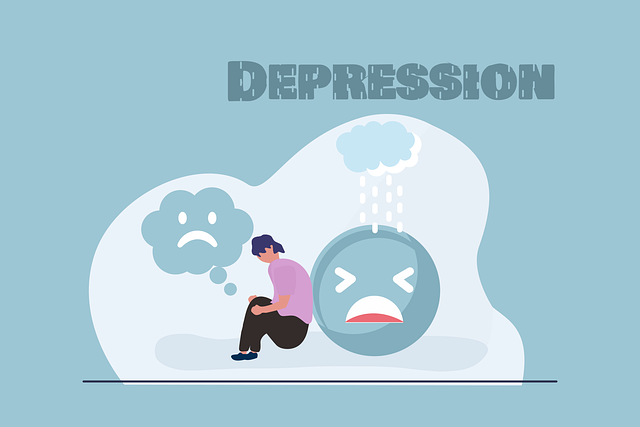Trauma, especially from distressing experiences like accidents or abuse, significantly impacts mental health, potentially leading to conditions like Centennial Bipolar Disorder. Effective support requires understanding individual trauma responses and fostering empathy in therapy. Techniques focusing on mood management, burnout prevention, and coping mechanism development enhance resilience and overall well-being. Centennial Bipolar Disorder Therapy offers specialized care, integrating evidence-based practices like conflict resolution and positive thinking exercises to manage intense emotions from traumatic experiences. A trauma-informed care framework, including staff training and self-care promotion, creates safe spaces for healing, emotion regulation, mood swing management, and improved overall well-being. Accessing resources like therapy, support groups, Mindfulness Meditation, and Compassion Cultivation Practices, grounded in Mind Over Matter principles, is crucial for healing complex conditions like Centennial Bipolar Disorder.
“Trauma, a profound and lasting impact on mental health, demands specialized support systems. This article explores comprehensive strategies for trauma assistance, focusing on the pivotal role of Centennial Bipolar Disorder Therapy in fostering recovery. We delve into the creation of effective, trauma-informed care frameworks, guiding individuals through the navigation process of accessing these services. By understanding trauma’s effect and leveraging evidence-based therapies like Centennial Bipolar Disorder Therapy, we can significantly enhance healing outcomes.”
- Understanding Trauma and Its Impact on Mental Health
- The Role of Centennial Bipolar Disorder Therapy in Trauma Support
- Building an Effective Trauma-Informed Care Framework
- Accessing and Navigating Trauma Support Services
Understanding Trauma and Its Impact on Mental Health

Trauma is an incredibly complex subject when it comes to mental health, and its effects can be profound. It refers to a deeply distressing or disturbing experience that overwhelms an individual’s ability to cope, often leading to long-lasting psychological scars. This could result from various events such as accidents, violence, abuse, or natural disasters. The impact of trauma is not limited to the moment; it can have lasting consequences on a person’s mental well-being, potentially leading to conditions like Centennial Bipolar Disorder.
Understanding trauma is crucial in providing effective support. It involves recognizing that each individual’s experience is unique and their reaction to traumatic events varies greatly. Strategies such as building empathy, which fosters a supportive environment, can be instrumental. Additionally, focusing on mood management techniques and burnout prevention strategies in therapy may aid individuals in processing their traumas. These approaches help people develop healthy coping mechanisms, enhance resilience, and ultimately improve their overall mental health and well-being.
The Role of Centennial Bipolar Disorder Therapy in Trauma Support

Centennial Bipolar Disorder Therapy plays a significant role in trauma support services by addressing the unique mental health needs of individuals dealing with both trauma and bipolar disorder. This specialized therapy recognizes that trauma can exacerbate bipolar symptoms, creating a complex interplay that requires tailored interventions. By integrating evidence-based practices, such as conflict resolution techniques and positive thinking exercises, Centennial Bipolar Disorder Therapy helps clients develop coping strategies to manage intense emotions stemming from traumatic experiences.
Moreover, the therapy focuses on enhancing social skills training, which is crucial for individuals with bipolar disorder who may struggle with interpersonal interactions due to mood episodes. This comprehensive approach ensures that trauma survivors receive holistic support, fostering their overall resilience and well-being. Through targeted interventions, Centennial Bipolar Disorder Therapy empowers clients to navigate their mental health journey more effectively, allowing them to rebuild their lives after traumatic events.
Building an Effective Trauma-Informed Care Framework

Creating a comprehensive trauma-informed care framework is essential to effectively support individuals who have experienced traumatic events, including those with bipolar disorder. This approach recognizes and understands how past traumas can impact an individual’s mental health and behavior, ensuring that care is tailored to their unique needs. By integrating this framework, healthcare providers can deliver more personalized and compassionate treatment, fostering a safe space for healing.
The process involves several key components such as training staff in trauma-informed practices, implementing crisis intervention guidance, and encouraging the development of self-care routines. This holistic approach aims to help individuals regulate their emotions, manage mood swings effectively, and build resilience. For instance, teaching mindfulness techniques or providing access to Centennial Bipolar Disorder Therapy can empower patients to navigate their mental health journey with greater ease and self-compassion, ultimately enhancing their overall well-being.
Accessing and Navigating Trauma Support Services

Accessing trauma support services is a vital step for individuals looking to heal from their past experiences. For those dealing with complex conditions like Centennial Bipolar Disorder, finding the right resources can be transformative. Many services exist to cater to diverse needs, including therapy options, support groups, and innovative practices such as Mindfulness Meditation and Compassion Cultivation Practices. These approaches, grounded in Mind Over Matter principles, offer holistic ways to address trauma’s impact.
Navigating these services requires a strategic approach. Individuals should research local and online resources, considering their specific requirements. Some may prefer one-on-one therapy sessions, while others might benefit from peer support groups. With the right guidance, accessing these services can open doors to healing and improved mental well-being.
Trauma support services play a pivotal role in helping individuals recover from the profound effects of traumatic experiences. By integrating knowledge about trauma and its impact on mental health, along with evidence-based practices like Centennial Bipolar Disorder Therapy, we can build robust trauma-informed care frameworks. Ensuring accessibility and navigating these services effectively are essential steps towards fostering healing and resilience among those who have endured trauma.









